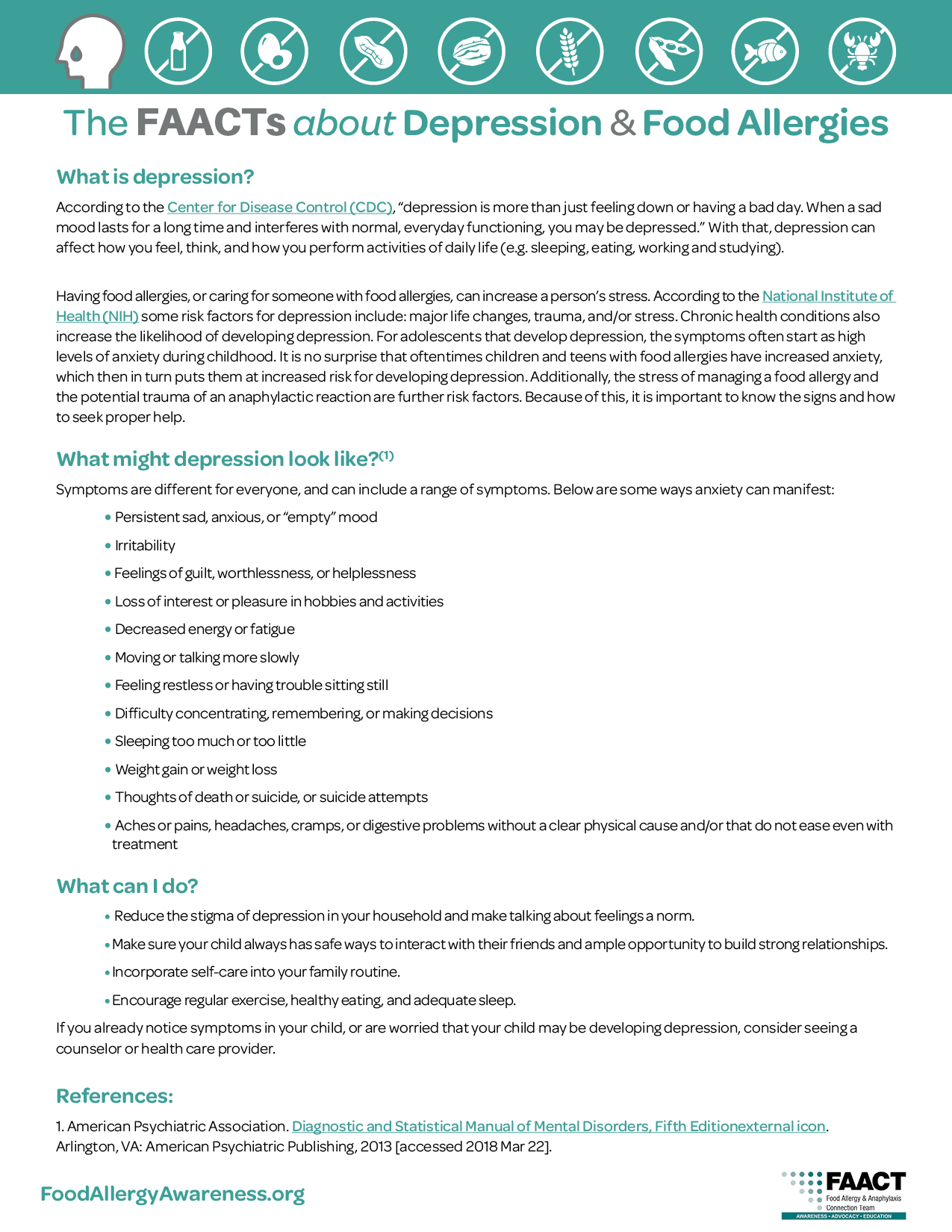Behavioral Health
Anxiety and Depression
Back to Category View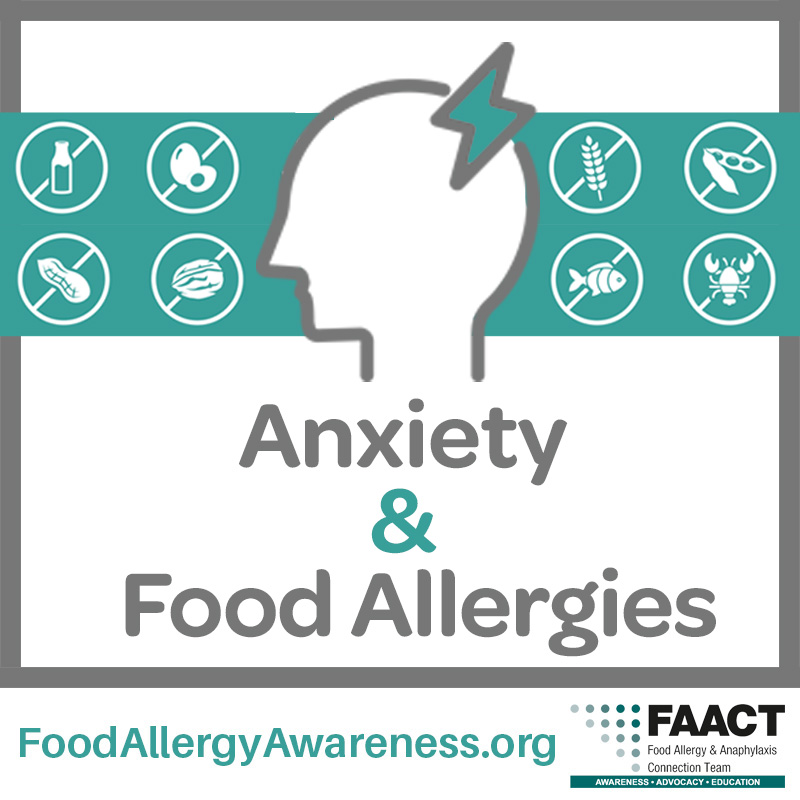
The FAACTs about Anxiety and Food Allergies
What is anxiety? What are anxiety disorders?
The American Psychology Association defines anxiety as, “An emotion characterized by feelings of tension, worried thoughts and physical changes like increased blood pressure.”
The National Institute of Health (NIH) defines an anxiety disorder as, “Anxiety disorders involve more than temporary worry or fear. For a person with an anxiety disorder, the anxiety does not go away and can get worse over time. The symptoms can interfere with daily activities such as job performance, school work, and relationships.”
Anxiety is a necessary part of life, so it is important to look at anxiety through a healthy lens. To an extent, having mild anxiety is an asset as it makes one more cautious when reading labels, ordering out, and may motivate one to carry one’s epinephrine etc. Still, children, teens, and young adults with food allergies are at a much higher risk for anxiety related disorders and feelings of worry. Anxiety that has gotten out of control can be managed with the right tools and supports.
What might anxiety look like?
Symptoms are different for everyone, and can include a range of symptoms. Below are some ways anxiety can manifest:
- Sweating
- Rapid heartbeat/trouble breathing
- Panic Attacks
- Stomach ache/headache/other physical symptoms/frequent visits to the school nurse
- Irritability/outbursts/restlessness
- Sleep issues
- Uncontrollable worry
- Recurring fears regarding everyday life tasks
- Avoidance of activities
- Perfectionist tendencies
- Meltdowns
Anxiety often comes from a perceived threat (one that often is imaginary). For those with food allergies... the threat is very real. Particularly troubling for those who have been diagnosed with food allergies, some symptoms of anxiety (e.g. trouble breathing or physical symptoms) can mirror those of an allergic reaction, further increasing anxiety. Exposure to stressful/negative life or environmental events in early childhood or adulthood can lead to developing anxiety, naturally, this may include a bad or anaphylactic reaction.
What can I do?
- When developing your child as a self-advocate, it is important to include exercises that could reduce your child's anxiety (e.g. making own cookbooks, role-playing, and adopting an overall positive outlook on the condition of food allergies).
- Normalize mental health issues and eliminate any stigma.
- Make self-care a priority in your household.
- Model: Remember, especially if your children are younger, they are looking to you as an example on how to practice healthy ways of thinking about their food allergies, how to react to challenging situations, and how to incorporate self-care habits.
- Learn coping strategies to effectively begin reducing anxiety!
If your child comes to you in a stressful or anxious moment, validate that some things are hard and uncomfortable. After you validate, help your child remember when things went right by giving them evidence of their prior safe experiences (dining out successfully, attending a birthday party with no issues, having a family meal etc.).
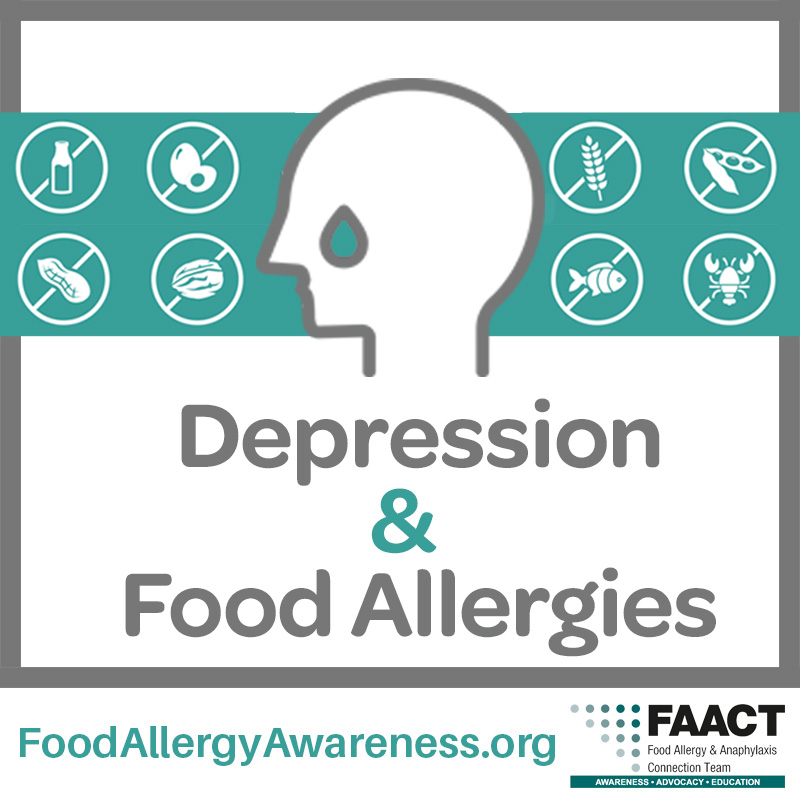
The FAACTs about Depression and Food Allergies
What is depression?
According to the Center for Disease Control (CDC), “depression is more than just feeling down or having a bad day. When a sad mood lasts for a long time and interferes with normal, everyday functioning, you may be depressed.” With that, depression can affect how you feel, think, and how you perform activities of daily life (e.g. sleeping, eating, working and studying).
Having food allergies, or caring for someone with food allergies, can increase a person’s stress. According to the National Institute of Health (NIH) some risk factors for depression include: major life changes, trauma, and/or stress. Chronic health conditions also increase the likelihood of developing depression. For adolescents that develop depression, the symptoms often start as high levels of anxiety during childhood. It is no surprise that oftentimes children and teens with food allergies have increased anxiety, which then in turn puts them at increased risk for developing depression. Additionally, the stress of managing a food allergy and the potential trauma of an anaphylactic reaction are further risk factors. Because of this, it is important to know the signs and how to seek proper help.
What might depression look like?(1)
- Persistent sad, anxious, or “empty” mood.
- Irritability.
- Feelings of guilt, worthlessness, or helplessness.
- Loss of interest or pleasure in hobbies and activities.
- Decreased energy or fatigue.
- Moving or talking more slowly.
- Feeling restless or having trouble sitting still.
- Difficulty concentrating, remembering, or making decisions.
- Sleeping too much or too little.
- Weight gain or weight loss.
- Thoughts of death or suicide, or suicide attempts.
- Aches or pains, headaches, cramps, or digestive problems without a clear physical cause and/or that do not ease even with treatment.
What can I do?
- Reduce the stigma of depression in your household and make talking about feelings a norm.
- Make sure your child always has safe ways to interact with their friends and ample opportunity to build strong relationships.
- Incorporate self-care into your family routine.
- Encourage regular exercise, healthy eating, and adequate sleep
If you already notice symptoms in your child, or are worried that your child may be developing depression, consider seeing a counselor or health care provider.
References:
- American Psychiatric Association. Diagnostic and Statistical Manual of Mental Disorders, Fifth Editionexternal icon. Arlington, VA: American Psychiatric Publishing, 2013 [accessed 2018 Mar 22].
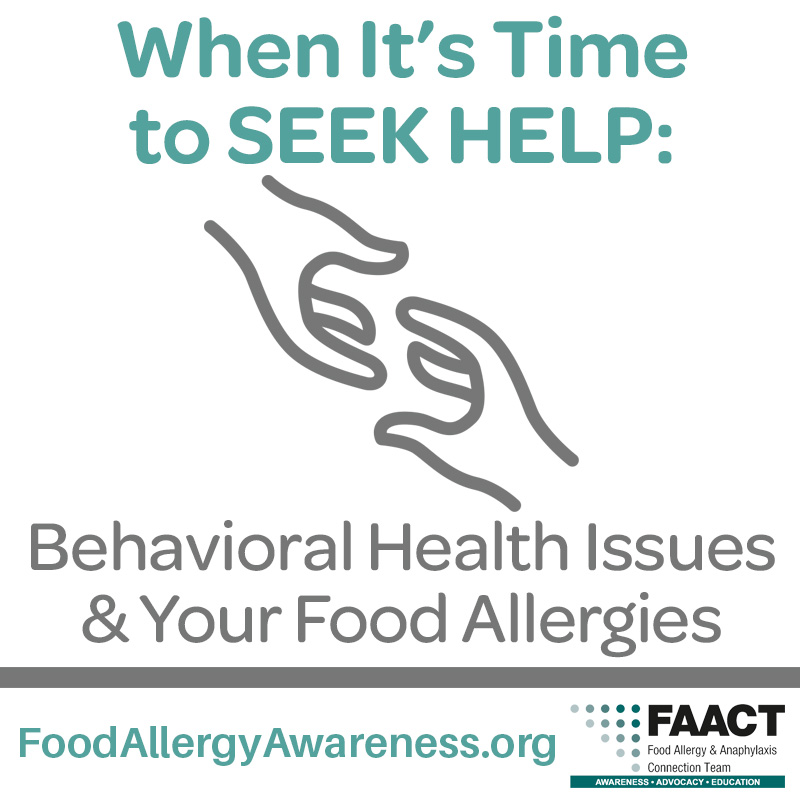
When It’s Time to Seek Help: Behavioral Health Issues and Your Food Allergies
Behavioral Health issues are prevalent now more than ever. According to the NIH 49.5% of adolescents aged 13-18 had any mental illness(1), with around 1 in 5 being a severe case. With that, nearly 1 in 5 U.S. adults(2) are currently living with a mental illness, but not all seek treatment.
It is possible that anxiety, depression, eating disorders, or other associated behavioral health concerns in children/teens with food allergies, as well as their parents/caretakers, could develop.
3 Signs a Counselor may be beneficial:
1. You no longer want to and/or can do the things you like to do
Disruption of your normal routine or avoiding situations that once brought you joy is a sure sign that something is wrong. Some avoidance behaviors (e.g. avoiding sushi restaurants because you have a fish allergy) are productive. However, if you (or your child) are now unable or unwilling to participate in events or situations they used to, the avoidance has gone too far. When these behaviors take over and interfere with your “normal” life, a counselor can help.
2. Something upsetting happened
People with food allergies face added life stressors. Having a bad allergic reaction or going into anaphylactic shock can be particularly distressing. In fact, this can even lead to PTSD-related symptoms (avoidance, increased anxiety, social problems, and more). Anaphylactic shock can be considered a traumatic life event. With that, there is a threat of death or a threat to the physical well-being of someone (or witnessing of a threat to the physical well-being of someone). It is only natural that a response may include one of fear, anxiety, or helplessness. A counselor can help you conquer avoidance behaviors and/or recurring thoughts about the reaction.
3. You are just feeling “not yourself”
We all have off days, but when off days become the norm (accompanied by persistent sadness, outbursts, or hopelessness) talking to someone could help! Sleeping more or less than usual, restricting eating, or lashing out at someone are some examples of how people try to regain control, however, they are not healthy coping strategies. If you are retreating from friendships, not going out to eat (if that is something you used to comfortably do), or are excessively worried when you do go do things—don’t be dismayed. Counselors can help you develop healthy coping strategies to get you back on track.
If increased negative feelings are getting in the way of your regular routine, it may be time to seek help. The sooner you seek counseling the sooner you will be able to get back to enjoying your life! To find a counselor near you with a history of working with those with food allergies, visit the Food Allergy Counselor Directory.
References:
1. Merikangas KR, He JP, Burstein M, Swanson SA, Avenevoli S, Cui L, Benjet C, Georgiades K, Swendsen J. Lifetime prevalence of mental disorders in U.S. adolescents: results from the National Comorbidity Survey Replication--Adolescent Supplement (NCS-A). J Am Acad Child Adolesc Psychiatry. 2010 Oct;49(10):980-9. PMID: 20855043
2. NIH. Prevalence of Any Mental Illness (AMI). National Institute of Mental Health. https://www.nimh.nih.gov/health/statistics/mental-illness.shtml#part_154910. Published February 2019.
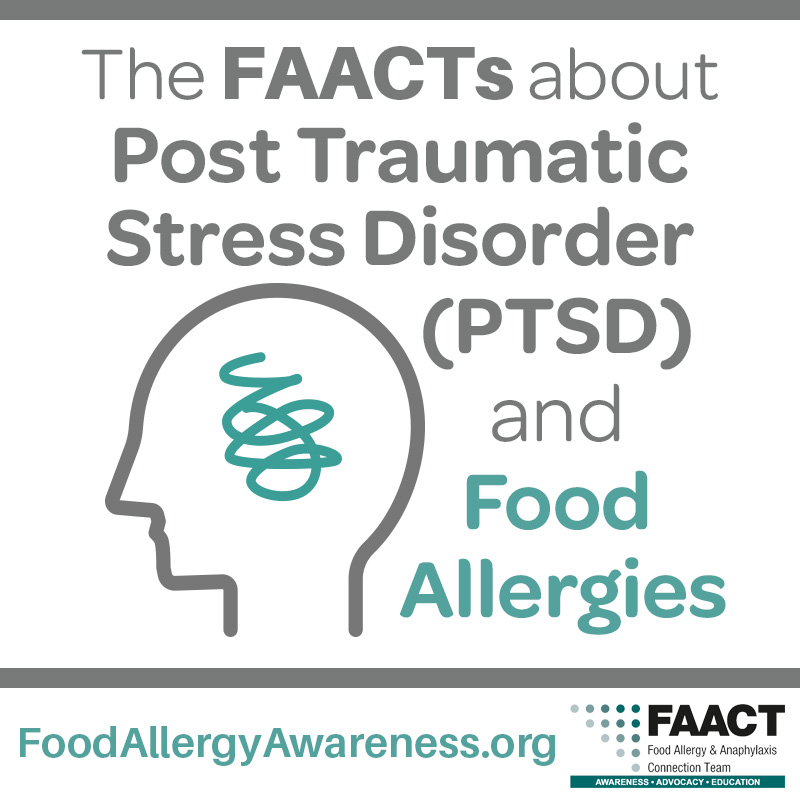
The FAACTs about Post-Traumatic Stress Disorder (PTSD) and Food Allergies
What is PTSD?
According to the National Institute of Health (NIH), “Post-traumatic stress disorder (PTSD) is a disorder that develops in some people who have experienced a shocking, scary, or dangerous event. People who have PTSD may feel stressed or frightened, even when they are not in danger.”
There are many risk factors when it comes to developing PTSD, including living through a trauma, experiencing a childhood trauma, having a friend or family member experience danger or harm, and/or the sudden, unexpected death of a loved one. For individuals with food allergy, experiencing anaphylaxis, seeing your child/friend experience anaphylaxis, or having a sibling or child die of anaphylaxis are all forms of trauma. After witnessing or experiencing this extreme stress scenario, PTSD can develop.(1)
What can PTSD look like?
For a more comprehensive list of signs and symptoms (as it can be highly varied), visit the National Institute of Health’s page on PTSD.
For very young children:
- Forgetting how to speak.
- Acting out the scary event or drawing it while playing.
- Being abnormally clingy with a parent or guardian.
Teens & Adults:
- Flashbacks (re-experiencing the trauma again and again, and it can even include the presence of a physical symptom such as a racing heart).
- Having bad dreams.
- Scary thoughts.
- Avoiding places or things that remind them of the event.
- Issues sleeping.
- Having angry outbursts.
- Negative thoughts about oneself or the world in general.
- Having distorted thoughts of guilt or blame.
Remember, these symptoms are a normal response to trauma! However, after a traumatic event, symptoms should improve over time. When your safety is threatened, such as in the case of experiencing anaphylaxis, it makes sense to feel fearful. Yet, for people that develop PTSD, the symptoms do not go away over time, in fact, they may even get worse.
What can I do?
- Risk factors can be countered by resilience factors. Resilience factors you can build include, but are not limited to, adaptability, humor, self-efficacy, patience, faith, having goals, and optimism.
- Learn effective coping strategies.
- Exercise to improve mood.
- Join a support group.
- Seeing a counselor is always a great option. Consider finding a provider with experience working with individuals who have food allergies.
References:
- Teufel, M., Biedermann, T., Rapps, N., Hausteiner, C., Henningsen, P., Enck, P., & Zipfel, S. (2007, July 7). Psychological burden of food allergy. Retrieved from https://www.ncbi.nlm.nih.gov/pmc/articles/PMC4146781/#B8
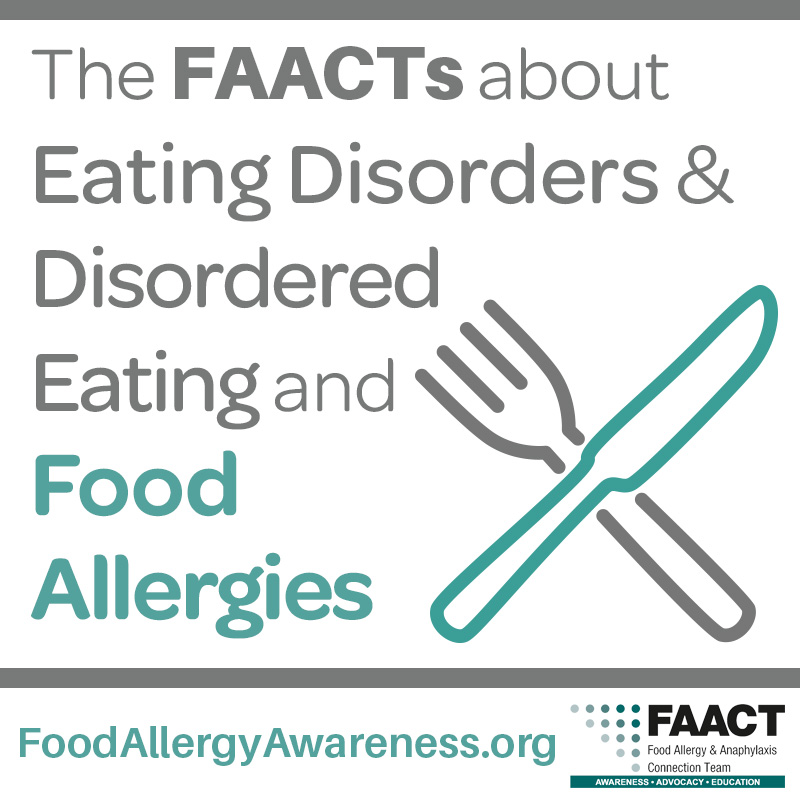
The FAACTs about Eating Disorders & Disordered Eating and Food Allergies
What is an Eating Disorder?
According to the National Institute of Health (NIH), “Eating disorders are -serious and often fatal illnesses that are associated with severe disturbances in people’s eating behaviors and related thoughts and emotions. Preoccupation with food, body weight, and shape may also signal an eating disorder. Common eating disorders include anorexia nervosa, bulimia nervosa, and binge-eating disorder.”
What is Disordered Eating?
According to the National Eating Disorder Collaboration, “Disordered eating is a disturbed and unhealthy eating pattern that can include restrictive dieting, compulsive eating or skipping meals.”
What is the Relationship between these and Food Allergies?
The prevalence of eating disorders among people with food allergies is unknown. However, there have been some studies that would suggest a connection. Since children and teens with food allergies can have increased anxiety surrounding food, they tended to restrict food more than non-allergic peers(1). With that, due to different factors including added stress and anxiety, it is no surprise that those with food allergies may have a more strained and disrupted relationship with food. For those with food allergies, food related anxieties could trigger disordered eating behaviors such as restriction or avoidance. Avoidance behaviors can eventually result in social isolation. Additionally, label reading is taught as a safe habit, and it is encouraged to check labels without fail. However, these checking behaviors are not uncommon for those with eating disorders, which is where the line becomes hard to define. It is important that safe practices are not taken too far in a way that can allow food-allergic individuals to hide their disordered habits under the guise of safety.
What Disordered Eating & Eating Disorders Look Like?
The three most common eating disorders are anorexia nervosa, bulimia nervosa, and binge-eating disorder, and all very different. Disordered eating can potentially be an early indicator of a more serious eating disorder. Below you will find a cluster of some symptoms that may apply to disordered eating:
- Fasting.
- Preoccupation appearance or food in a way that negatively affects quality of life.
- Skipping meals.
- Binge eating.
- Self-induced vomiting.
- Restrictive eating.
- Food avoidance, or avoiding certain categories of food such as carbs.
- Misusing laxatives.
- Using diet pills.
- Anxiety around certain foods.
- Overuse of exercising to “make up” for what they ate.
What Can I Do?
- Help your child build confidence in their allergy management! One study showed that young people were more likely to have eating disorders or unhealthy restrictive eating if they were not confident in food allergy related issues.(2)
- If you are a parent, you can encourage your child to become their own self-advocate. Sending them to FAACT’s Camp TAG is pivotal to developing lifelong skills to manage food allergies.
- If you are a teen, attending FAACT’s Annual Teen Retreat or becoming a volunteer teen counselor at Camp TAG are great places to build confidence and friendships with food-allergic peers.
- As a parent, you can practice caution without instilling anxiety.
- Use healthy language when talking about food (e.g. not saying this food is “good” or this food is “bad”).
- Promote positive body images: our children listen to how we speak about ourselves!
- Discuss the dangers of dieting/restrictive eating.
- Discuss media messages and how they can show that only certain body types are acceptable.
- Be a self-esteem builder and praise your child for what they can do rather than what they look like!
- Encourage open communication with your children.
- If you are worried about your own or your child’s eating habits, it may be time to seek professional help. Consider finding a provider with experience working with individuals who have food allergies.
References:
- Avery, N., et al. (2003). “Assessment of quality of life in children with peanut allergy.” Pediatric Allergy and Immunology react-text: 50 14(5):378-82
- Wróblewska, B., Szyc, A. M., Markiewicz, L. H., Zakrzewska, M., & Romaszko, E. (2018, June 26). Increased prevalence of eating disorders as a biopsychosocial implication of food allergy. Retrieved from https://www.ncbi.nlm.nih.gov/pmc/articles/PMC6019672/
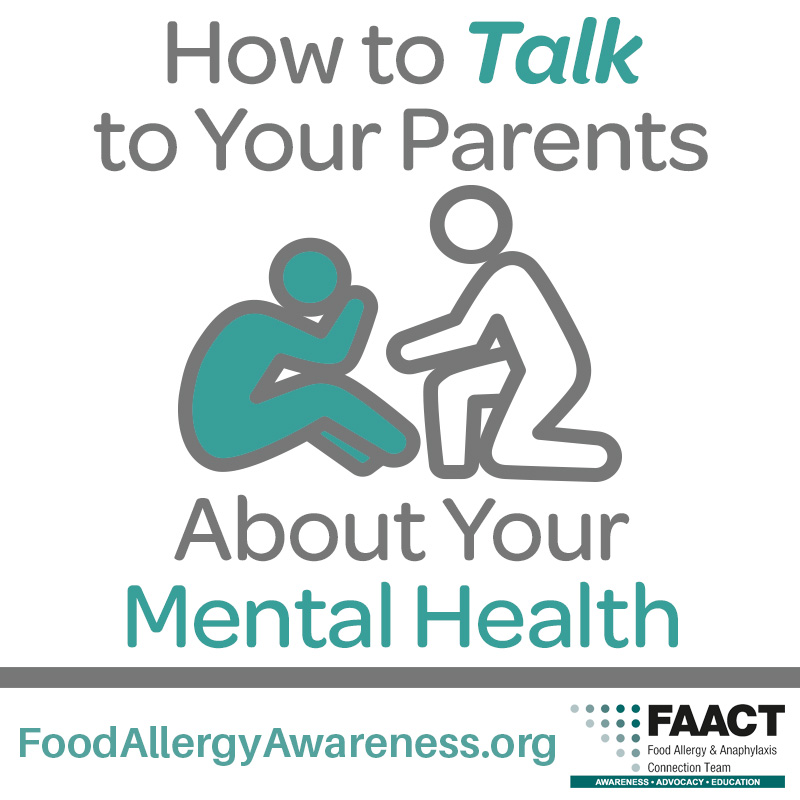
How to Talk to Your Parents About Your Mental Health
It’s amazing that you are ready and want to talk to your parents about your mental health! This is super brave and courageous—good job!
Being a pre-teen or teen with food allergies can sometimes be tough, stressful, or anxiety inducing. You have extra challenges and face the added life stressor of having a very real threat to your wellbeing all around you because food seems to be everywhere! It isn’t uncommon for at some point or another this all to become too much.
First, know that YOU ARE NOT ALONE! According to the National Health Institute (NIH) half of adolescents aged 13-18 have some type of mood disorder(1). There is help for you and having a constructive conversation with your parents can be a great first step toward a better mental well-being.
Tips for a Successful Conversation:
- Pick a time that works well for both you and your parent.
Conversations can be tough, but one way to make them easier is to make sure both you and your parent are in the best place. If you know your parent gets stressed after work, then pick a different time. Or if you are really overwhelmed before school, then wait until after. You want to address this topic at a time that makes sense and is low stress for both of you. - Prepare, prepare, prepare!
Sometimes you can feel better when you plan out exactly what you are going to say. Think about what you want to say and how you want to say it. If the idea of saying it out loud seems too overwhelming, you could also write it down in a note and hand it to your parents. - Give details.
Your parents want to help you. However, if they don’t clearly know what’s going on, then they can’t do their best to help. Give the details you feel comfortable with, but be clear. Being direct and not overanalyzing is often a good way to approach these conversations. There’s nothing wrong with asking for help! - Don’t wait!
There is no time better than today. If there is something going on in your life that is affecting you, the sooner you ask for help the sooner you begin the journey to feeling better. Just telling someone how you feel can even be a great relief.
What to Expect:
- Parents aren’t perfect, so don’t be upset if you don’t get the exact response you were hoping for. Go over the different possible outcomes in your head to try and be less surprised by their answer. Trust us, parents are often way more sympathetic & loving than they are judgmental.
- Parents might want to ask you more questions. That’s okay! They are just trying to understand your thoughts and feelings. If it’s too difficult, it’s okay to tell them that it is hard to explain what you are feeling or that you want to pick the conversation back up a little later.
- They may suggest seeing a counselor or another health care provider. Counseling/therapy is a great option and can be very helpful!
Conversation Starters:
- “Hey, Mom? Could we talk? I have been feeling way more anxious than usual lately. I think I might need help.”
- “I’m not feeling myself lately. I just don’t feel right.”
- “I have some important things on my mind. I am wondering if there is a good time to talk?
- “Dad, for the past month (week, year, etc.), I have been feeling stressed (hopeless, depressed, anxious, lonely, etc.). Telling you makes me nervous, but I am telling you because I trust you.”
- “I have been feeling unlike myself for a while. Telling you makes me feel more anxious, but I am telling you because I don’t know what to do.”
- “I haven’t been myself lately. I don’t want to feel like this anymore, can you help me?”
Often these conversations are just the beginning. Seeing a counselor is always a great option to follow-up with if there is a concern. Consider finding a provider with experience working with individuals who have food allergies.
References:
- Merikangas KR, He JP, Burstein M, Swanson SA, Avenevoli S, Cui L, Benjet C, Georgiades K, Swendsen J. Lifetime prevalence of mental disorders in U.S. adolescents: results from the National Comorbidity Survey Replication--Adolescent Supplement (NCS-A). J Am Acad Child Adolesc Psychiatry. 2010 Oct;49(10):980-9. PMID: 20855043
Download FAACT's Eating Disorders/Disordered Eating and Food Allergies handout.
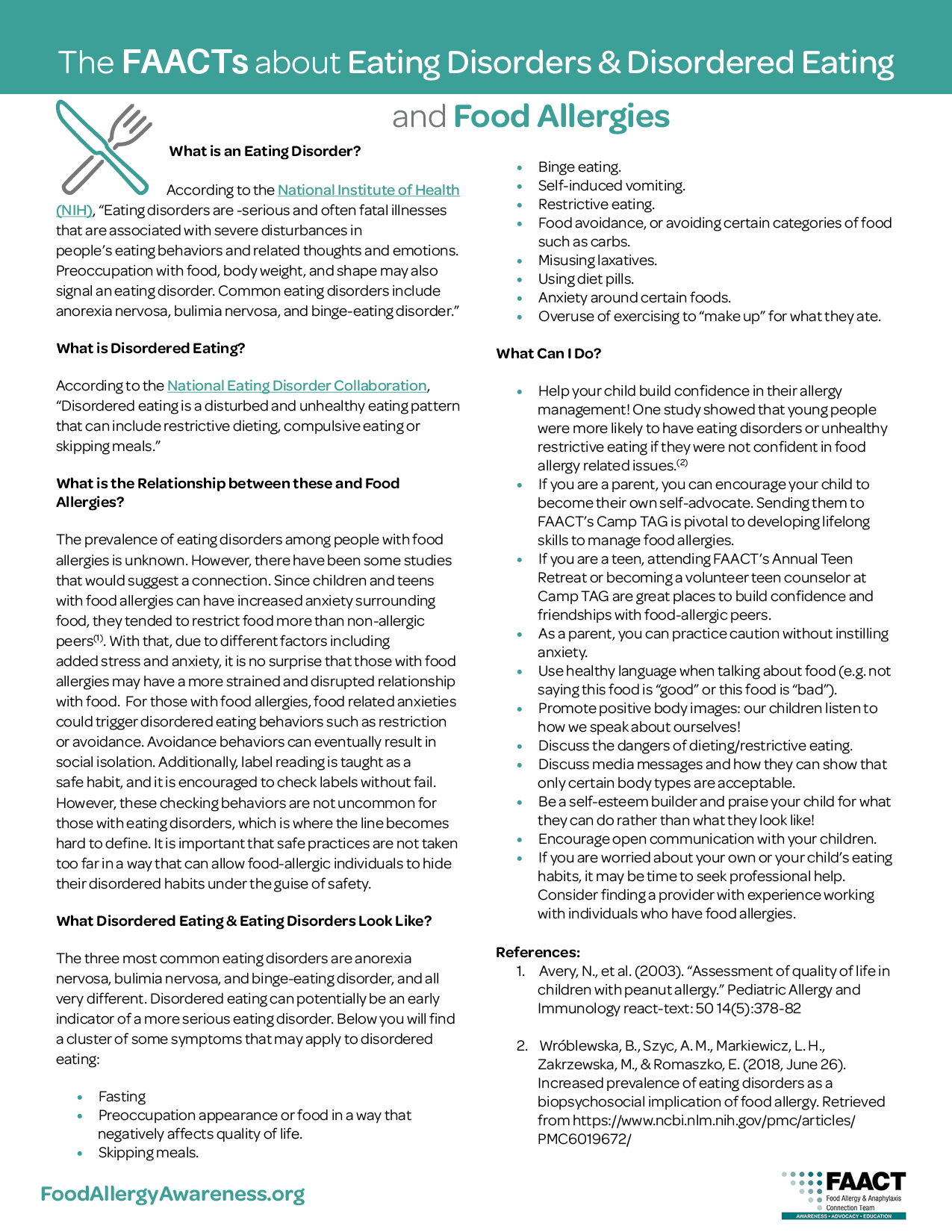
Download FAACT's "When It's Time to Seek Help" handout.
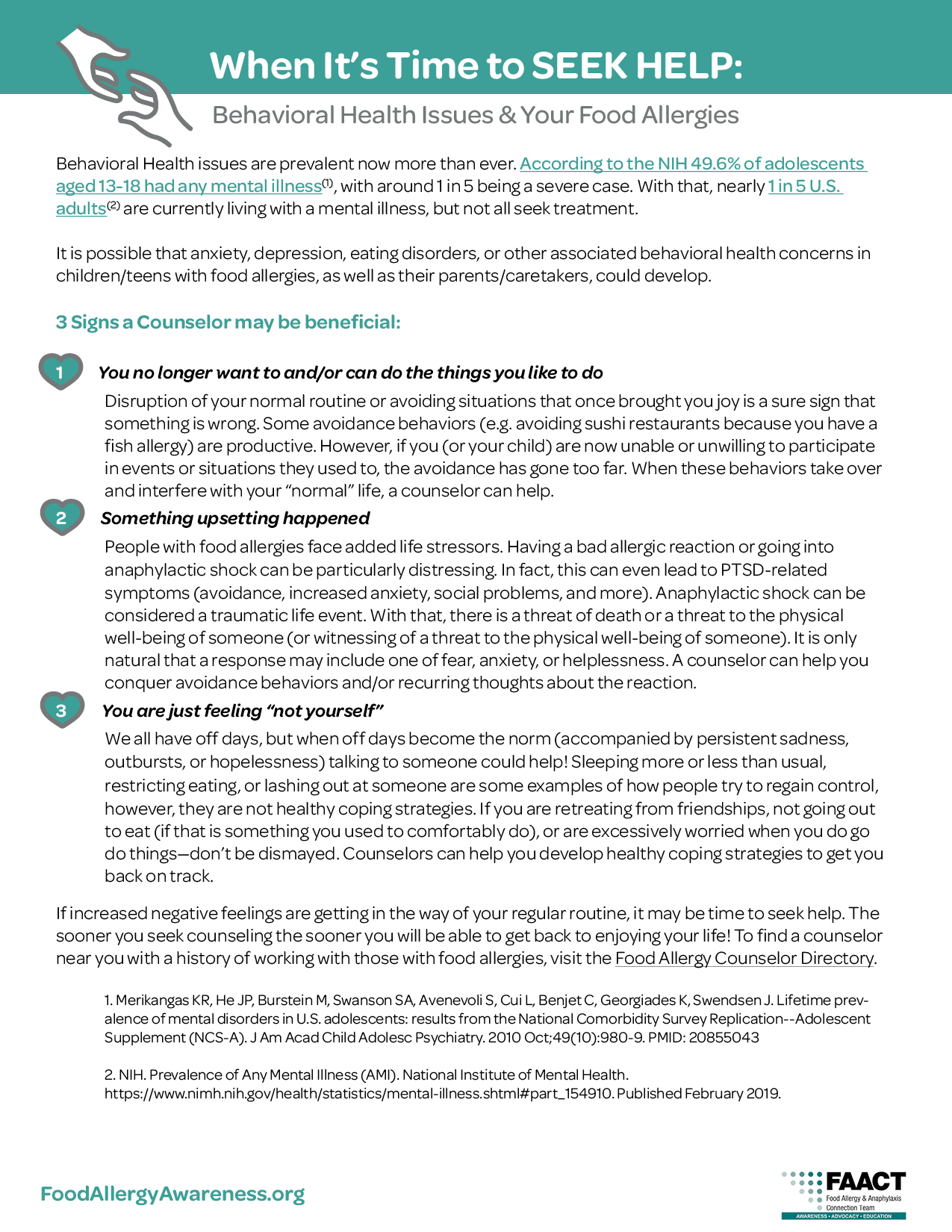
Download the FAACTs About Anxiety and Food Allergies handout.
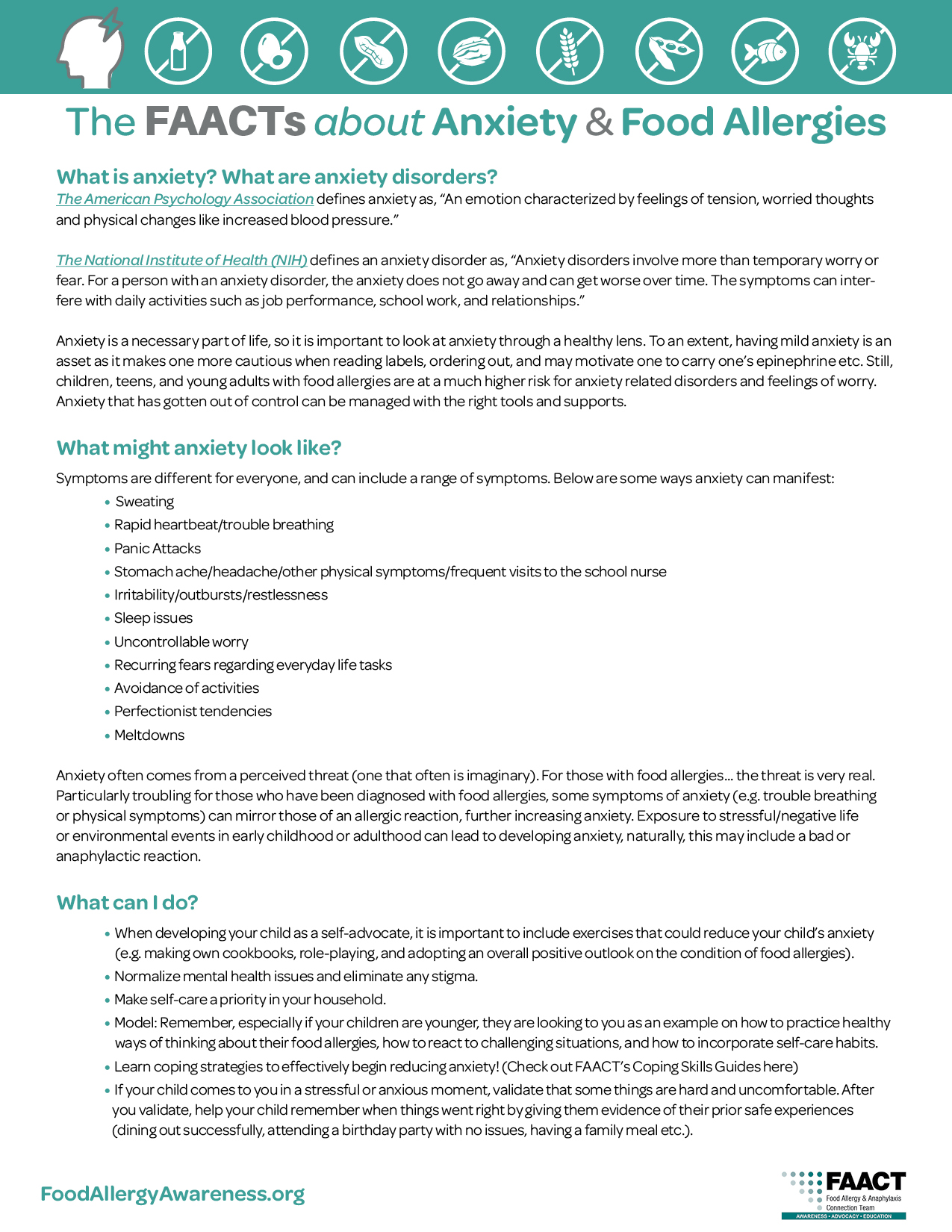
Download FAACT's How to Talk to Your Parents About Your Mental Health handout.
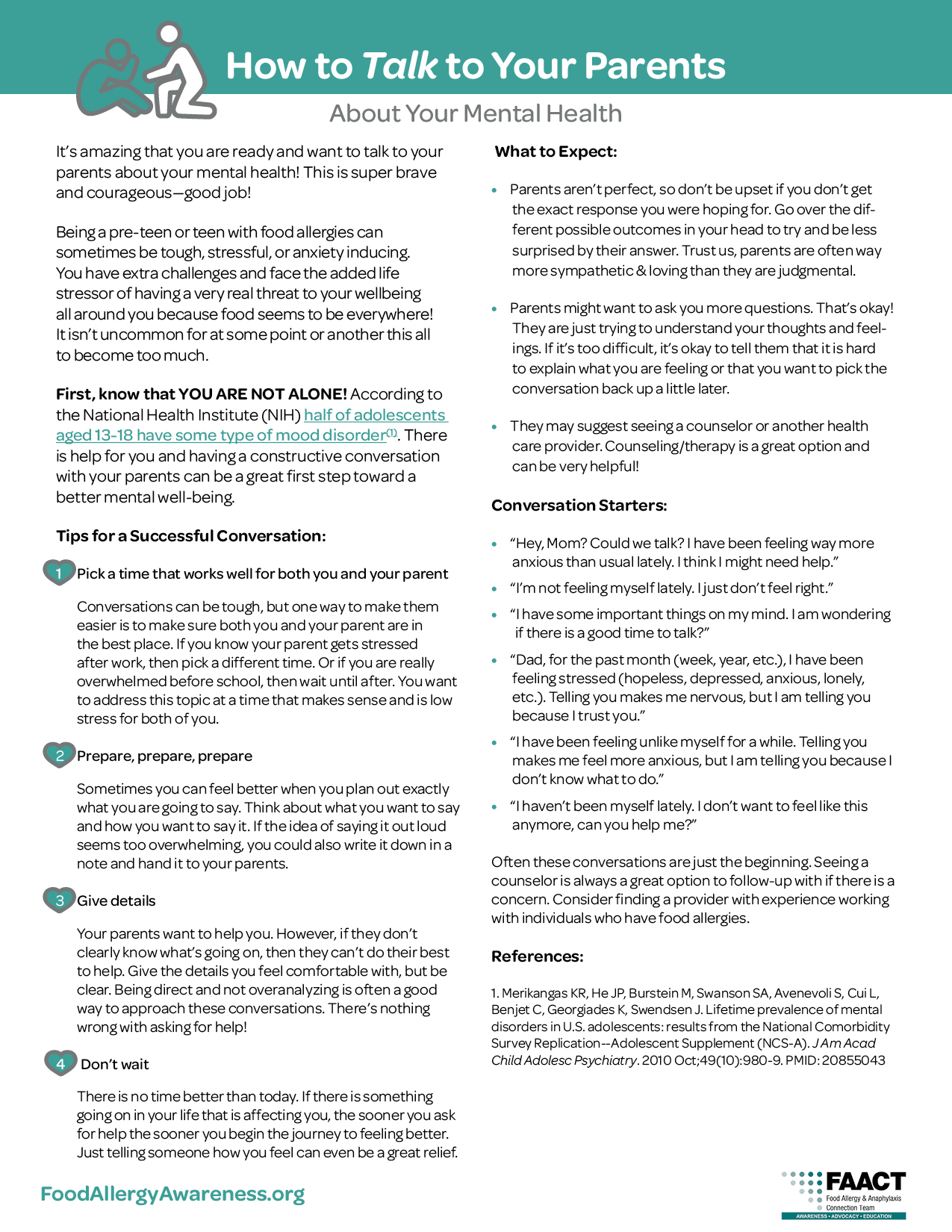
Download FAACTs about Post Traumatic Stress Disorder (PTSD) and Food Allergies handout.
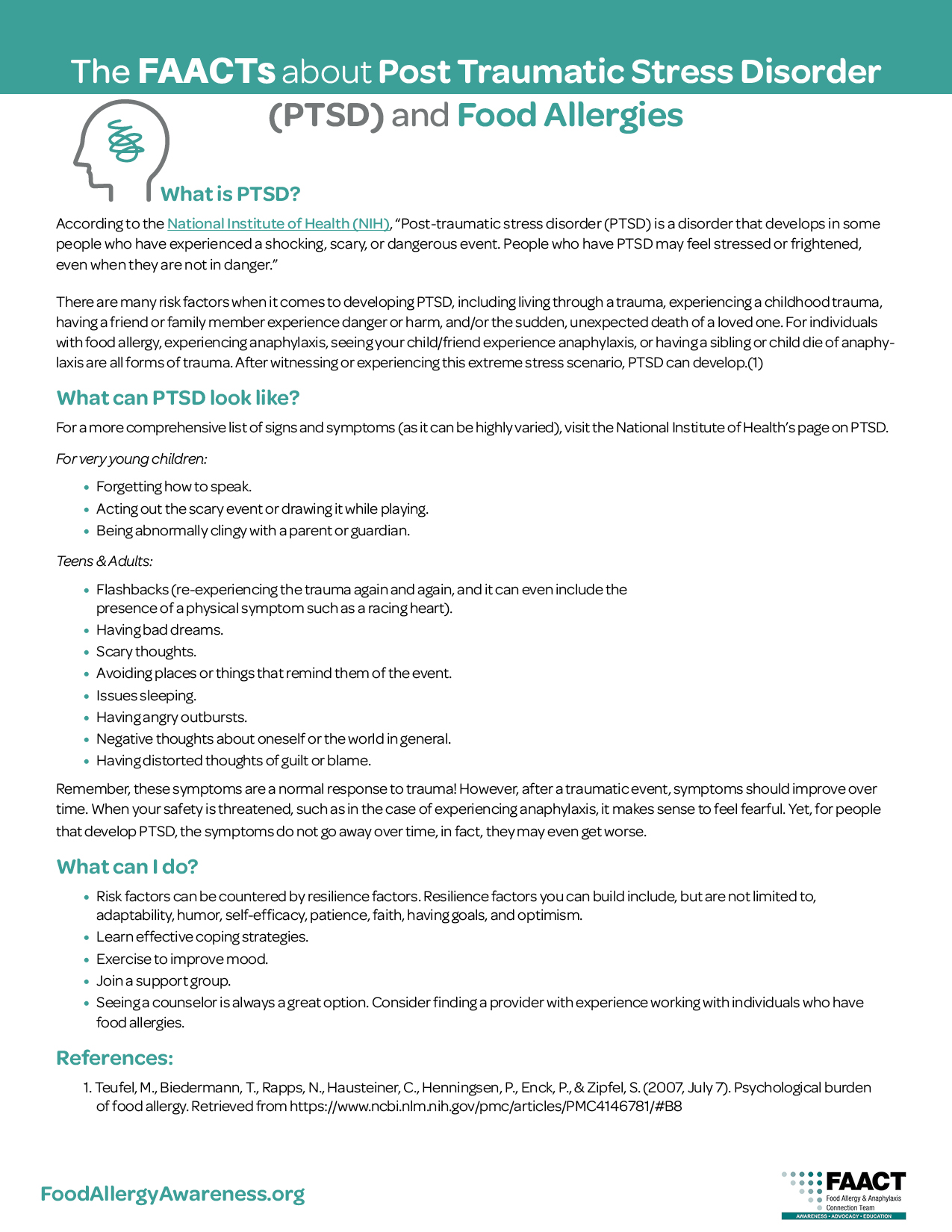
Download FAACTs about Depression and Food Allergies handout.
